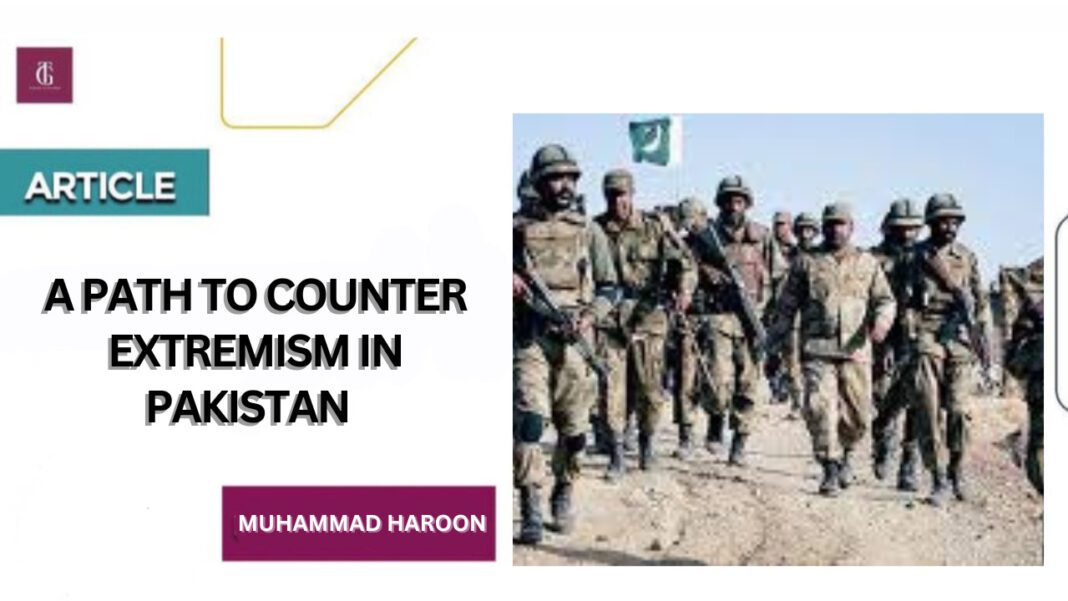Extremism poses a significant threat to Pakistan’s stability and progress. To effectively counter this menace, adopting a comprehensive approach that focuses on empowering communities is crucial. By addressing the root causes of extremism, promoting education and economic opportunities, fostering social cohesion, and encouraging community engagement, Pakistan can build resilience and create an environment where extremism finds no fertile ground to thrive.
Socioeconomic disparities play a pivotal role in the rise of extremism. Poverty, unemployment, and lack of economic opportunities create a breeding ground for radicalization. The state must prioritize inclusive economic growth, job creation, and skill development programs to counter this. Individuals can acquire the necessary tools to improve their livelihood by investing in education and vocational training. Promoting entrepreneurship and supporting small businesses can also empower communities and reduce their vulnerability to extremist influences.
Education is a powerful tool in the fight against extremism. By providing quality education to all children, irrespective of their socio-economic background or gender, Pakistan can lay the foundation for a tolerant and inclusive society. The state must ensure access to schools, improve the quality of education, and promote critical thinking and civic values. Educating children about human rights, democracy, and pluralism can help build resilience against extremist ideologies. Engaging parents and communities in the education system can foster a sense of ownership and enhance its effectiveness.
Building social cohesion is vital in countering extremism. Pakistan is a diverse country with various ethnic, religious, and cultural communities. Embracing this diversity and promoting interfaith dialogue and understanding can bridge divides and foster a sense of unity. The state should facilitate platforms for people from different backgrounds to unite, engage in dialogue, and appreciate each other’s perspectives. By promoting tolerance, respect, and acceptance, Pakistan can create a society that values diversity and rejects extremist ideologies.
Communities play a crucial role in countering extremism at the grassroots level. The state should actively involve communities in decision-making processes and empower them to become agents of change. Local leaders, civil society organizations, and religious figures can collaborate to develop community-led initiatives that address the root causes of extremism. By providing support, resources, and training to community-based organizations, the state can strengthen their capacity to promote peace, tolerance, and social cohesion.
Online platforms have become breeding grounds for extremist ideologies in today’s digital age. Efforts must be made to counter online radicalization and misinformation. The state should collaborate with tech companies, social media platforms, and civil society organizations to monitor and remove extremist content. Promoting digital literacy and critical thinking skills can help individuals identify and reject extremist propaganda. Moreover, creating positive online spaces that promote dialogue, tolerance, and constructive engagement can counter the influence of extremist narratives.
Effective law enforcement and judicial reforms are crucial in combating extremism. The state should enhance the capacity of law enforcement agencies to investigate and prevent extremist activities. It is imperative to ensure that individuals involved in extremist violence are brought to justice swiftly and through a fair and transparent legal process. Additionally, reforms should focus on addressing gaps in the legal system that allow extremist elements to evade accountability.
Combating extremism requires international cooperation. Pakistan should actively engage with the international community, sharing experiences, best practices, and intelligence to counter transnational extremist networks. Collaboration with neighboring countries in intelligence sharing, border management, and countering the financing of extremism can enhance regional security. By fostering international partnerships, Pakistan can strengthen its efforts to counter extremism and promote regional peace and stability.
Countering extremism in Pakistan requires a multifaceted approach that empowers communities and addresses the underlying causes of radicalization. By focusing on socioeconomic development, quality education, social cohesion, community engagement, countering online radicalization, law enforcement, judicial reforms, and international cooperation, Pakistan can create an environment resistant to extremist ideologies.
Empowering communities through inclusive economic growth, job creation, and skill development, programs can uplift individuals and reduce their susceptibility to extremist influences. Providing quality education to all children, and promoting critical thinking and civic values can equip the younger generation with the tools to reject extremist ideologies. Embracing diversity, promoting interfaith dialogue, and fostering social cohesion can bridge divides and foster community unity.
Engaging communities in decision-making processes and supporting community-led initiatives can empower them to actively participate in countering extremism. Collaboration with tech companies and social media platforms can help monitor and remove extremist content online while promoting digital literacy, and positive online spaces can counter the influence of extremist narratives.
Strengthening law enforcement agencies and implementing judicial reforms are essential in ensuring that individuals involved in extremist activities are held accountable through a fair and transparent legal process. International cooperation, particularly with neighboring countries, is crucial in countering transnational extremist networks and promoting regional security.
The road to countering extremism in Pakistan will require commitment, collaboration, and sustained efforts from the government, civil society, religious leaders, and the international community. By prioritizing community empowerment, addressing socioeconomic disparities, promoting education, fostering social cohesion, countering online radicalization, strengthening law enforcement, implementing judicial reforms, and engaging in international cooperation, Pakistan can pave the way for a more peaceful and prosperous future.
Ultimately, the success in countering extremism lies in creating a society that values peace, tolerance, and inclusivity. By empowering communities, addressing root causes, and promoting a culture of dialogue and understanding, Pakistan can build resilience against extremist ideologies and create an environment where all individuals can thrive and contribute to a harmonious society.






